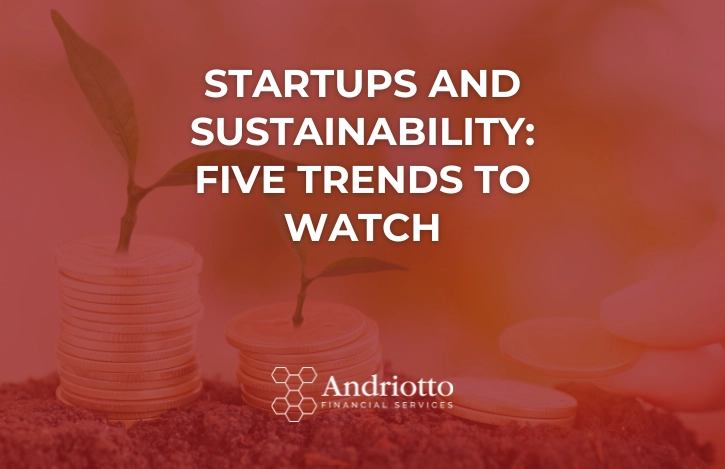Startups and sustainability are becoming inseparable as environmental concerns drive global business priorities. The recent floods in Libya, extreme heatwaves in Europe, the earthquake in Morocco, and the wildfires in Los Angeles highlight climate change’s destructive power. These events are no longer isolated disasters but triggers of widespread economic instability.
Businesses worldwide now recognise that sustainability must move to the core of their strategies. Without this shift, long-term profitability and operational resilience are at risk. This article explores five emerging trends in startups and sustainability and their implications business competitiveness and long-term relevance.
Inaction Is a Costly Business Risk
Ignoring climate action is no longer an option. Studies warn that global GDP may shrink by up to 18% by 2050 if mitigation measures are not implemented. The financial stakes for businesses are rising sharply.
A 2024 report by the Boston Consulting Group and the World Economic Forum revealed concerning data. Companies that delay decarbonisation risk profit losses of 5% to 25%, mainly due to climate change escalating impacts. In contrast, those that invest early in climate adaptation can achieve returns up to 19 times their original investment. Proactive climate action, therefore, is not only responsible but economically smart.
Investors are paying close attention. Global ESG assets are expected to reach $40 trillion by 2030. This makes sustainable business practices a critical factor in attracting funding. For startups, securing investment will depend on how well sustainability is embedded in business models. Startups and sustainability are now tightly linked, and those that lag behind may lose both funding opportunities and market relevance.
AI’s Double Role in Sustainability
Artificial intelligence is transforming sustainability efforts across industries. AI enables startups to optimise energy consumption, minimise waste, and improve decision-making processes. Predictive analytics allow companies to anticipate disruptions in supply chains due to climate events, reducing potential losses.
Material innovation, driven by AI, supports the development of biodegradable packaging and lab-grown alternatives to high-emission materials. Automation further enhances process efficiency. However, AI’s carbon footprint cannot be overlooked.
According to the MIT Technology Review, training one AI model can emit as much carbon as five cars over their entire lifespan. Therefore, startups must make mindful choices about computing resources. Collaborating with cloud providers committed to net-zero emissions and adopting energy-efficient AI models can mitigate these effects. This balanced approach reinforces the connection between startups and sustainability.
Rethinking Business Models Through Regeneration
Traditional business models that prioritise profit and growth are no longer sufficient. Environmental responsibility is redefining success. In fashion, for example, brands focusing on sustainability might enjoy stronger customer loyalty and command higher prices.
The rise of “regenerative business” reflects this shift. Regeneration goes beyond reducing harm to actively restoring natural ecosystems. Startups in agriculture, construction, and consumer goods are leading the way. These companies use bio-based materials, design circular production systems, and support rewilding projects.
Governments and consumers alike reward such efforts. Subsidies for carbon capture and ecosystem restoration create fresh opportunities for innovation. Startups and sustainability converge here, offering fresh market potential for those willing to pioneer regenerative practices.
Agility and Innovation: The Startup Advantage
Startups possess a crucial edge over legacy corporations. Without legacy systems and outdated infrastructures, new companies can build sustainability into every aspect of their operations.
Circular economy principles, carbon accounting in financial planning, and net-zero supply chains can all be integrated from the beginning. This agility makes startups better positioned to respond to changing regulations and consumer demands.
Digital-first startups benefit even more. Technologies such as blockchain enable transparent sourcing. Green fintech solutions help manage sustainable financing. Such tools allow these businesses to scale efficiently while staying true to sustainable principles.
Collaboration remains essential. Partnering with impact investors, sharing green infrastructure, and joining industry alliances accelerate progress. These partnerships enhance the positive impact of startups and sustainability working together.
Sustainability Reporting: A Growing Competitive Edge
The EU’s Corporate Sustainability Reporting Directive (CSRD) is reshaping corporate behaviour. While most startups remain exempt for now, the ripple effects reach them through larger companies.
Corporations subject to the CSRD must assess the ESG performance of their suppliers. Startups with robust sustainability reports will gain an advantage. They will find it easier to win contracts with large businesses focused on responsible sourcing.
As a result, sustainability reporting becomes a lever for growth. Automated tools such as AI-driven carbon management software simplify the reporting process. This technology transforms ESG data into strategic insights, helping startups to lead markets, attract responsible investors, and build lasting customer trust.
Startups and sustainability align closely here, as transparent reporting not only meets regulatory expectations but also builds business value.
The Future of Startups and Sustainability
Startups and sustainability will remain closely intertwined as the business world faces climate-driven challenges. Early action on sustainable practices opens doors to investment, customer loyalty, and market growth. Startups that embrace these five trends—climate risk mitigation, responsible AI use, regenerative business models, digital innovation, and transparent reporting—will gain a competitive edge. As a result, they will play a key role in shaping tomorrow’s economy.
The link between startups and sustainability is now too strong to ignore. Those who act decisively today will define the successful enterprises of tomorrow.
At AFS, we are passionate about fostering innovation and empowering ambitious minds to flourish. Our mission is to provide best-in-class financial services for traditional and crypto deals, exploit European grants, and use quantitative methods to improve clients’ performance. We aim to help our customers unlock their full business potential.
Let’s unlock your enterprise’s full potential together!
Get in touch at [email protected].


